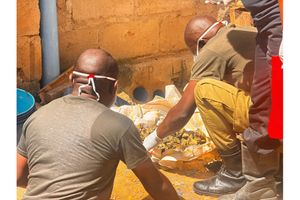Report exposes political dimension of Tanzania’s abduction crisis

Some of the individuals reported missing in 2024
What you need to know:
- The report, titled The Resurgence of the Unknown Assailants, was launched on Monday, May 5, 2025, in Dar es Salaam
Dar es Salaam. A new report by the Legal and Human Rights Centre (LHRC) has revealed nearly 100 cases of abduction and enforced disappearance in Tanzania between 2015 and February 2025, exposing a troubling resurgence of political violence linked to the so-called "unknown assailants."
The report, titled The Resurgence of the Unknown Assailants, was launched on Monday, May 5, 2025, in Dar es Salaam, and follows the first documentation of such incidents in the LHRC's 2017 report.
The latest findings indicate a significant rise in reported cases, particularly in 2022 and 2024, which together account for almost two-thirds of the total documented incidents.
During the launch, LHRC researcher Mr Fundikira Wazambi noted that there were no recorded incidents in 2019 and 2020, which marks a troubling shift in 2021 onwards.
“Just over a third of the cases—35 percent—occurred in Dar es Salaam, followed by Arusha with 26 percent,” he said.
Among the most notable incidents from 2024 were the shooting of Simanjiro MP and CCM politician Mr Christopher Ole-Sendeka by unidentified gunmen, and the disappearance of Shadrack Chaula, which occurred 20 days after his release from prison.
Opposition party members, particularly from Chadema, were also frequent targets. Victims included Deusdedith Soka, Jacob Mlay, Frank Mbise, Dioniz Kipanya, Ali Kibao, and Kombo Mbwana. ACT-Wazalendo youth wing leader Abdul Nondo was also among those affected.
The report also highlights a decrease in mob violence, with 39 incidents in 2024 compared to 42 in 2023.
However, mob violence remains a significant issue in the country, with approximately 500 incidents occurring annually, predominantly on the mainland.
In one highly publicised case, a Tanzania Revenue Authority (TRA) officer, Mr Amani Simbayao, was lynched by a mob in Tegeta, Dar es Salaam, in December 2024, after being mistaken for an abductor.
Four suspects were arrested in connection with the incident. Other cases of mob violence included the killing of two individuals in Tabora over witchcraft accusations and the brutal killing of three members of a family in Dodoma. Notably, adult males accounted for 95 percent of all mob violence victims in 2024.
Additionally, the report draws attention to the human rights impact of predatory lending practices.
Findings suggest that such loans have led to severe financial distress, property seizures, borrower humiliation, and even mental health issues, with 73 percent of borrowers facing financial difficulties and 41 percent suffering from mental health issues.
The report also cites cases of social stigma, child neglect, and malnutrition linked to predatory lending.
The LHRC also documented six cases of extra-judicial killings in 2024, all involving male victims.
Among these was the alleged shooting of Mr George Juma Mohamed, an opposition candidate in the 2024 Local Government Elections, by police officers in Manyoni, Singida.
Other extra-judicial killings were linked to wildlife officers from the Kilimanjaro National Park (Kinapa) and the Tanzania National Parks Authority (Tanapa), who were arrested and prosecuted.
Witchcraft-related killings continue to be a grave issue, with the report documenting 23 such killings in 2024, similar to previous years.
Half of these occurred in Dodoma and Singida, with many orchestrated by traditional healers.
A particularly disturbing case involved the murder of a four-month-old infant by her grandmother in Kagera Region for ritual purposes.
In response to the findings, the LHRC has called for several reforms, including the reinstatement of the constitutional reform process and the implementation of recommendations from the Presidential Criminal Justice Commission.
“A truly independent investigative body must be established, especially since many suspects are drawn from the defence and security forces,” said Mr Wazambi. “Such a body must be trusted by citizens and be easily accessible.”
Further recommendations include broad legal and policy reforms, strengthening labour laws, and increasing budget allocations for education, health, and agriculture to tackle underlying societal issues.




